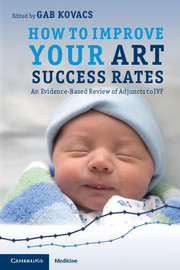Book contents
- How to improve your ART success rates
- How to improve your ART success rates
- Copyright page
- Contents
- Contributors
- Section 1 Patient selection and preparation
- Section 2 The role of AIH before IVF
- Section 3 Stimulation
- Section 4 Monitoring
- Section 5 Laboratory
- Chapter 23 Sperm selection for assisted conception
- Chapter 24 ICSI for all?
- Chapter 25 Day of embryo transfer
- Chapter 26 The beneficial effects of culture medium supplementation with growth factors in the development of human embryos in vitro
- Chapter 27 Metabolomics
- Chapter 28 Role of preimplantation genetic diagnosis
- Chapter 29 Assisted hatching
- Section 6 Embryo transfer
- Section 7 Ancillary treatments
- Section 8 Assessment of results
- Index
Chapter 28 - Role of preimplantation genetic diagnosis
from Section 5 - Laboratory
Published online by Cambridge University Press: 05 July 2011
- How to improve your ART success rates
- How to improve your ART success rates
- Copyright page
- Contents
- Contributors
- Section 1 Patient selection and preparation
- Section 2 The role of AIH before IVF
- Section 3 Stimulation
- Section 4 Monitoring
- Section 5 Laboratory
- Chapter 23 Sperm selection for assisted conception
- Chapter 24 ICSI for all?
- Chapter 25 Day of embryo transfer
- Chapter 26 The beneficial effects of culture medium supplementation with growth factors in the development of human embryos in vitro
- Chapter 27 Metabolomics
- Chapter 28 Role of preimplantation genetic diagnosis
- Chapter 29 Assisted hatching
- Section 6 Embryo transfer
- Section 7 Ancillary treatments
- Section 8 Assessment of results
- Index
Summary
- Type
- Chapter
- Information
- How to Improve your ART Success RatesAn Evidence-Based Review of Adjuncts to IVF, pp. 152 - 155Publisher: Cambridge University PressPrint publication year: 2011



